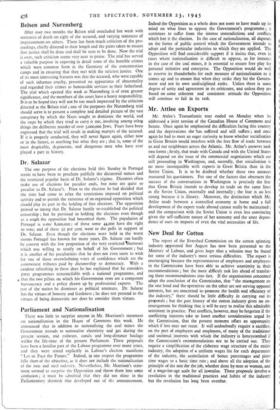New Deal for Cotton
The report of the Evershed' Commission on the cotton spinning industry appointed rest August has now been presented to the Ministry of Labour, and gives hope 'that t solution may be found for some of the industry's most serious difficulties. The report is encouraging because the representatives of employers and employees in the Commission have been able to achieve unanimity in their recommendations ; but the more difficult task lies ahead of translat- ing these recommendations into fact. If the organisations concerned adopt the conclusion of the Commission, that "the management on the one hand and the operatives on the other are not serving opposed interests, but are concerned to promote the health and efficiency of the industry," there should be little difficulty in carrying out its proposals ; but the past history of the cotton industry gives no en- couragement for thinking that it will be easy to realise this admirable sentiment in practice. Past conflicts, however, may be forgotten if the conflicting interests take to heart another consideration urged by the Commission, that the present moment offers an opportunity which if lost may not recur. It will undoubtedly require a sacrifice, on the pert of employers and employees, of many of the traditional and sectional interests with which the industry is honeycombed if the Commission's recommendations are to be carried out. They require a simplification of the elaborate wage structure of the entire industry, the adoption of a uniform wages list for each department of the industry, the assimilation of bonus percentages and piece time wages to a basic time rate ; and above all the adoption of the principle of the rate for the job, whether done by men or women, and of a wage-for-age scale for all juveniles. These proposals involve a revolution in the traditional practices and habits of the industry but the revolution has long been overdue.


























 Previous page
Previous page